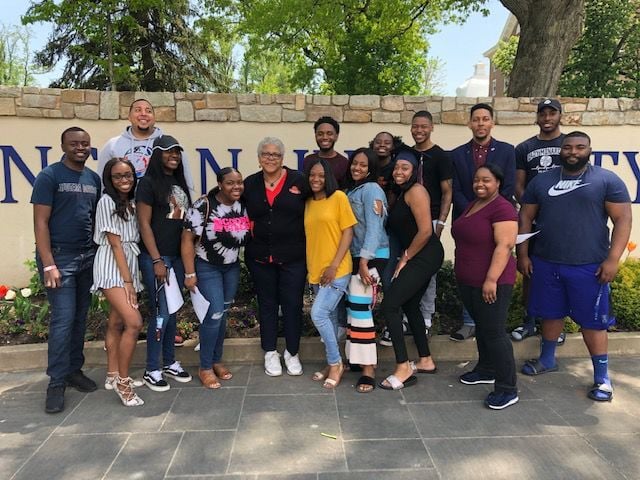Lincoln University President Brenda A. Allen stands with students on the university’s campus in Oxford in southern Chester County – PHOTOS COURTESY OF LINCOLN UNIVERSITY
by Chanel Hill, Philadelphia Tribune Staff Writer
Lincoln University President Brenda A. Allen said her vision for the historically Black institution over the next seven years is to be financially healthy and continue its historical tradition in the liberal arts.
Allen, an alumna of Lincoln, was appointed the 14th president of the university in 2017. Her contract was recently extended by the university’s board of trustees. She will continue her role as president through 2030.
Founded in 1854, Lincoln is the oldest degree-granting HBCU in the country and is located in Oxford in southern Chester County.
“I also want us to rediscover who we are and be unapologetic about it,” she said. “Lincoln’s historical strength and legacy is its tradition of the liberal arts. We want to make sure that identity is firm and that we’re supporting our curriculum in a way that faculty can deliver that education.
“If we’re able to do those two things and everything else flows nicely from that, retention gets better,” she added. “Graduation rates get better and post-graduation success gets better. Overall, our reputation rebounds to where it was historically as one of the premier liberal arts colleges in this country.”
Allen said the university’s student enrollment increased this fall after a decline during the pandemic.
“We were on a roll previous to COVID,” Allen said. “Our undergraduate program has gotten close to 2,000 students. However, we lost some ground during the pandemic where we saw a number of students who just stopped out and a lot of classes were affected.
“This fall, we saw a 2% increase in enrollment in our new first-year students,” she said. “We’re now back up to 1,750 students and we’re hoping to build on that number to get us back to the numbers we had before the pandemic.”
Last month, Gov. Josh Shapiro signed into law HB1461, an act that provides funding for state-related universities for the fiscal year beginning July 1, 2023, and ending June 30, 2024.
The bill increased Lincoln’s state funding by nearly $19 million, or 21%, over last year. The majority of Lincoln’s students come from households that make less than $60,000 a year, and 70% of the university budget comes from tuition and fees.
Allen said the money from the state appropriation would be used for scholarships, faculty positions and operations.
“That increase is important, especially for the students we serve,” Allen said. “We have a large number of students from the lowest economic realm and we have many more who are also just above that line.
“Making sure that that model is enough to support the number of students that we have,” she added. “We’ve also grown enrollment and not faculty, so we will also be using dollars to increase faculty.”
Gov. Josh Shapiro visited Lincoln University on Dec. 1 and met with a group of students who marched 66 miles from the university to Harrisburg to protest a delay in state appropriations for four universities. He signed the bill during his visit.
The state-funding bill was signed after a group of Lincoln students now known as the “Freedom Fourteen” marched 66 miles from the university to Harrisburg to protest the prolonged delay in state appropriations for Lincoln, Temple University, Penn State University and the University of Pittsburgh.
Shapiro visited Lincoln University and met with the students on Dec. 1. During his visit, he held a bill-signing ceremony.
Allen said she was told by a lawmaker that the students’ march to Harrisburg helped get the bill signed.
“People thought the delay in the state appropriation would have a negative effect on the students, but it really gave the students an opportunity to exercise their civic duty,” Allen said.
“The students really went back into the history of Lincoln students involved in major protests, from students leaving to go to the Civil War in the 1800s, to those who marched in Selma and in Oxford around the same time as desegregation.
“They used that history to create their own initiative. They marched for all of the state-related universities and their voices were really heard,” Allen said.
“We were worried about that journey, but our alumni and all of the community people along the way supported them,” she added. “It just shows that if you use your voice to speak out and march for positive change it will make a difference. They turned a lemon into lemonade. We’re so proud of them.”
Allen said she wants students to leave Lincoln being prepared for their future.
“I would hope they would take away from Lincoln what I took away from it and that is, you leave here prepared to take on the world,” Allen said.
“Your experiences here have prepared you to really move in any direction, any circle and any activity that pleases you,” she said. “Your possibilities will only be limited by your own imagination.
“Lincoln should be a place that gives you the foundation to go out into the world and do what you want to do,” she added. “That can happen for you if you take full advantage of every opportunity that we have.”
